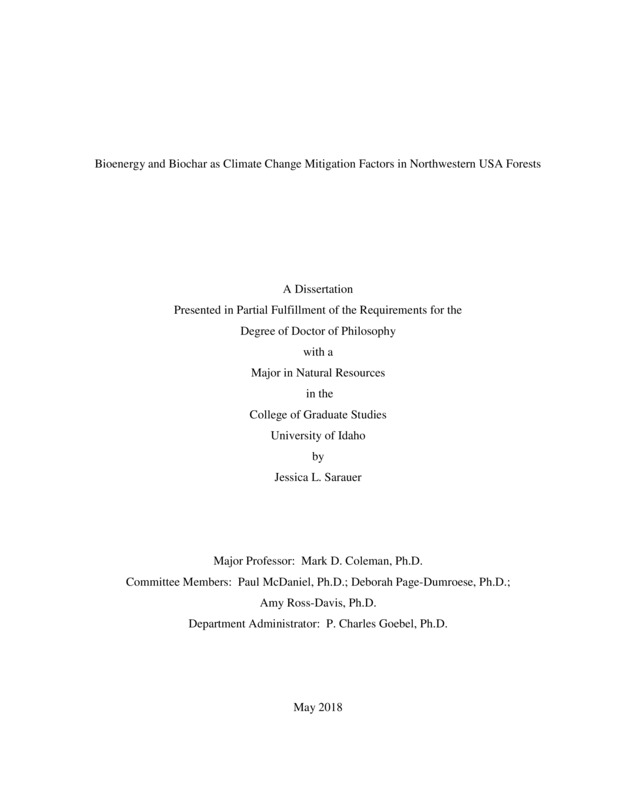Bioenergy and Biochar as Climate Change Mitigation Factors in Northwestern USA Forests
Sarauer, Jessica. (2018-05). Bioenergy and Biochar as Climate Change Mitigation Factors in Northwestern USA Forests. Theses and Dissertations Collection, University of Idaho Library Digital Collections. https://www.lib.uidaho.edu/digital/etd/items/sarauer_idaho_0089e_11341.html
- Title:
- Bioenergy and Biochar as Climate Change Mitigation Factors in Northwestern USA Forests
- Author:
- Sarauer, Jessica
- Date:
- 2018-05
- Keywords:
- Carbon Sequestration Container Fertilizer Greenhouse Gas Peat
- Program:
- Natural Resources
- Subject Category:
- Forestry
- Abstract:
-
Woody biomass can be a source for bioenergy production as an alternative to fossil fuel energy with potential to mitigate climate change. Climate change mitigation by bioenergy use is investigated in this dissertation using three studies that explore woody bioenergy crops. First, hybrid poplar bioenergy plantations and adjacent agricultural crops at three northwestern locations were monitored for soil greenhouse gases (GHGs). Converting agricultural land to bioenergy crops did not adversely affect soil GHG fluxes. Second, this dissertation investigated the utilization of the bioenergy co-product, biochar. Biochar is a soil amendment that can be used to potentially mitigate climate change by affecting GHG emissions or carbon (C) sequestration. Biochar amendment was applied at three rates (0, 2.5, and 25 Mg ha-1) to the soil surface of five northwestern conifer forests one to five years prior to measuring soil GHG fluxes, C content, microbial community, and tree diameter growth. Biochar amendments increased C content at the highest application rate and did not affect soil GHGs, microbial communities, or tree diameter growth. Finally, tree seedlings for forest regeneration were grown with biochar amended to peat-based growing media to reduce peat and fertilizer needs in an operational forest nursery. Biochar amendment decreased seedling growth, most likely due to increased pH, but biochar amended seedlings had increased cold hardiness and greater root growth potential (for a given seedling size). Biochar amendment did not reduce fertilizer needs to grow an equivalent-sized seedling. Information in this dissertation can be used for climate change mitigation strategies by land managers, specifically for soil greenhouse gas emission reduction and C sequestration tools.
- Description:
- doctoral, Ph.D., Natural Resources -- University of Idaho - College of Graduate Studies, 2018-05
- Major Professor:
- Coleman, Mark D
- Committee:
- McDaniel, Paul; Page-Dumroese, Deborah S; Ross-Davis, Amy
- Defense Date:
- 2018-05
- Identifier:
- Sarauer_idaho_0089E_11341
- Type:
- Text
- Format Original:
- Format:
- application/pdf
- Rights:
- In Copyright - Educational Use Permitted. For more information, please contact University of Idaho Library Special Collections and Archives Department at libspec@uidaho.edu.
- Standardized Rights:
- http://rightsstatements.org/vocab/InC-EDU/1.0/

